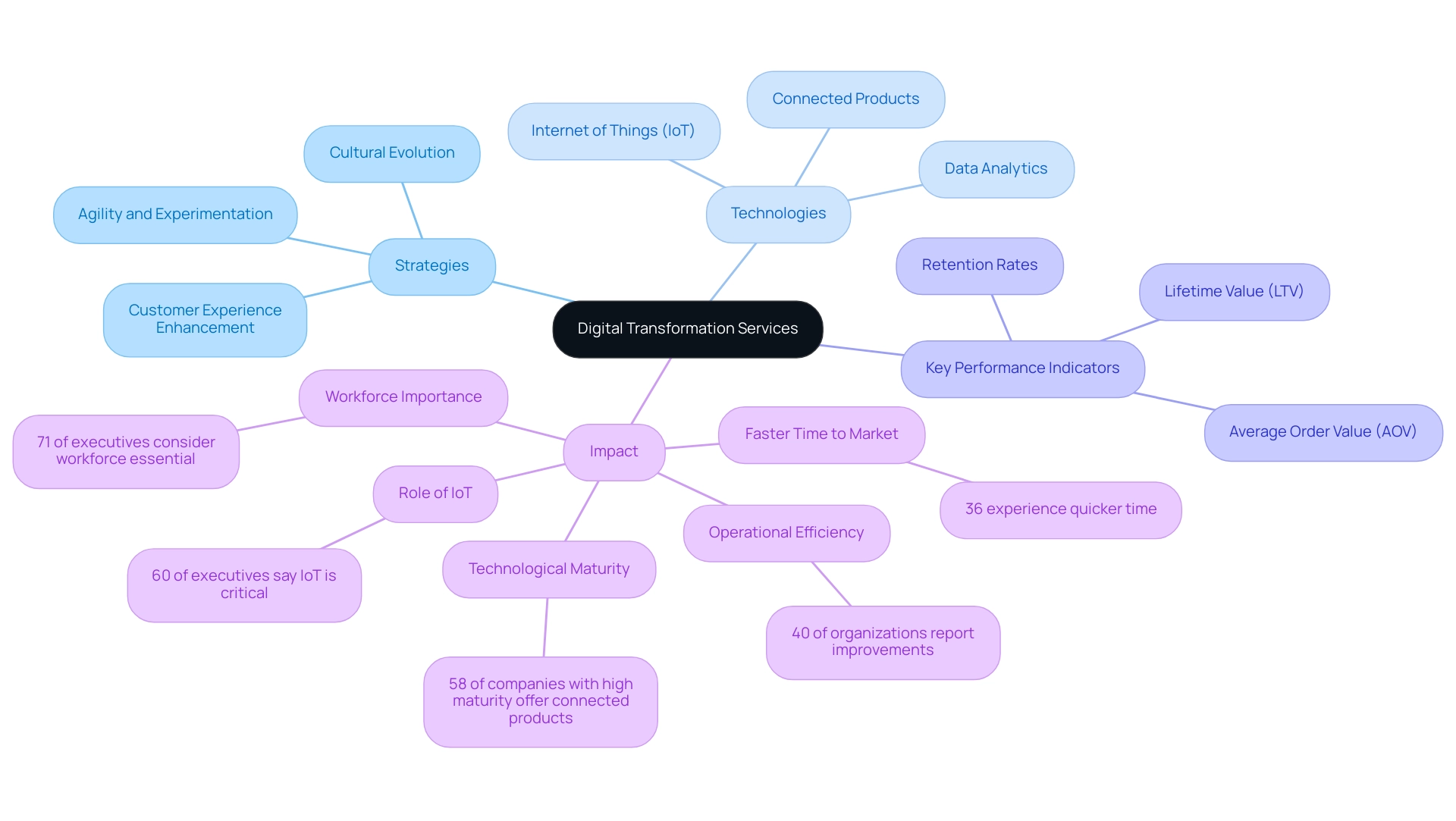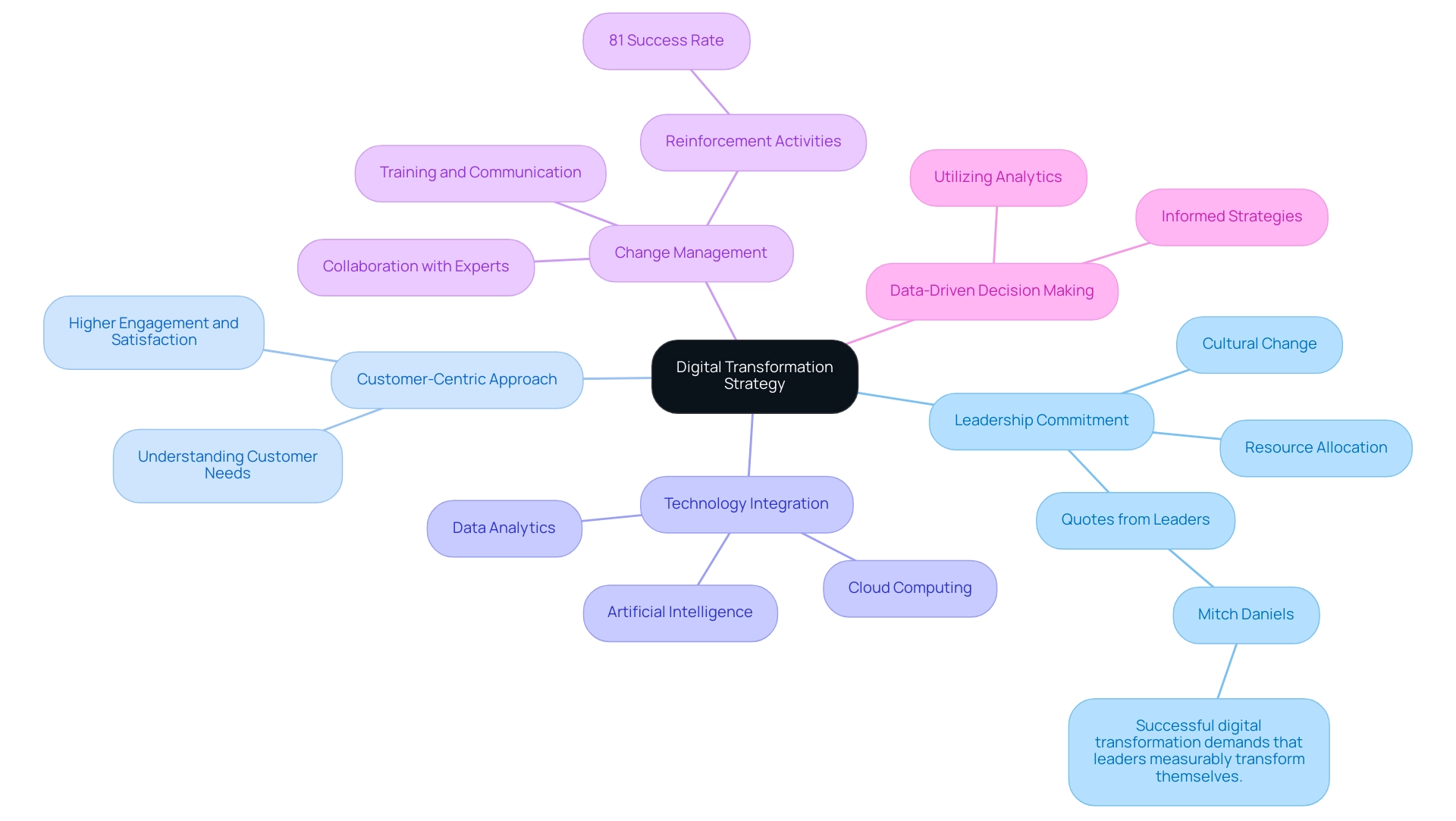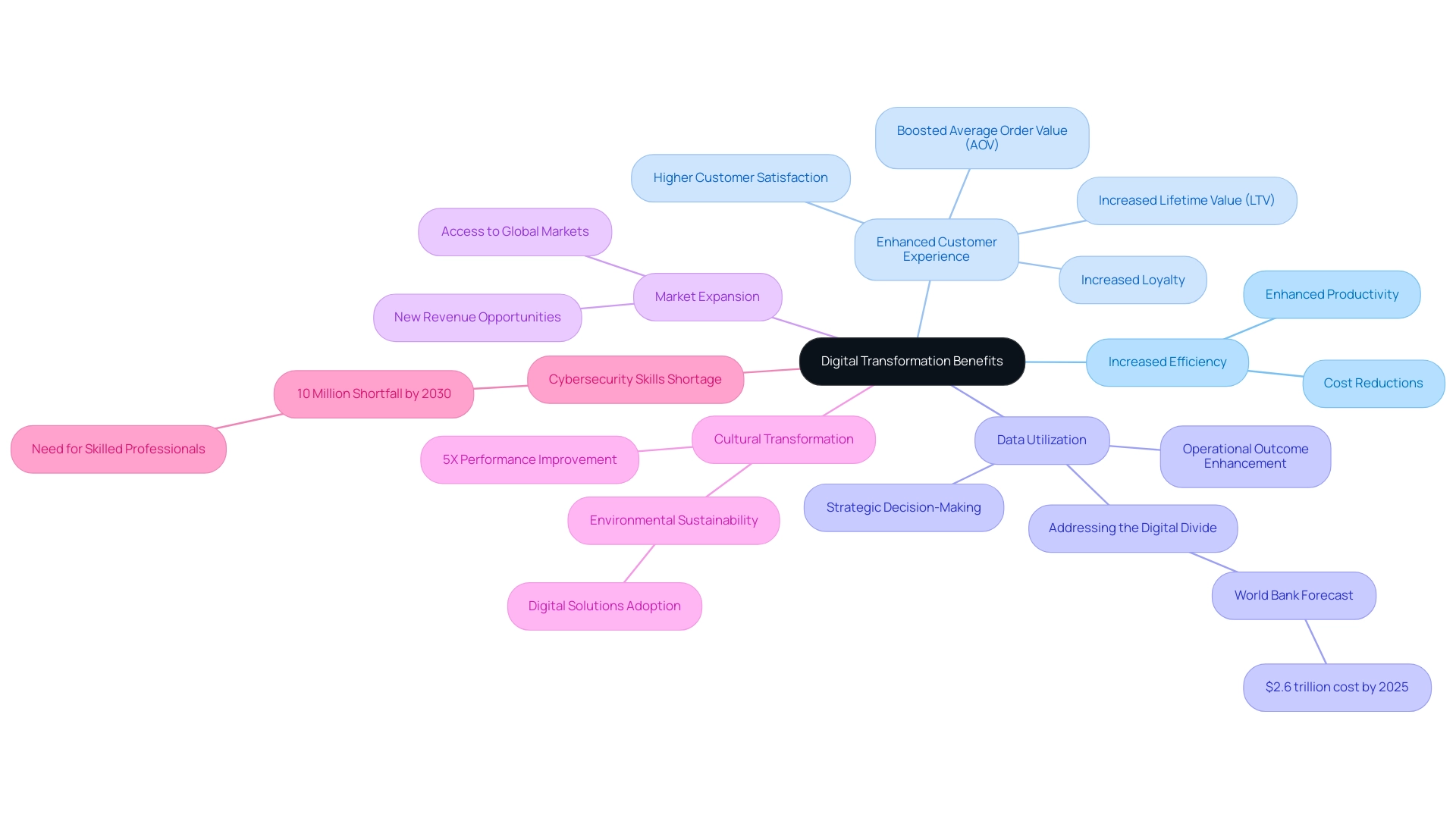Introduction
In an age where digital innovation dictates the pace of business evolution, organizations are compelled to embrace digital transformation services that redefine their operational frameworks. This comprehensive shift not only integrates advanced technologies but also fosters a cultural metamorphosis within companies, urging them to challenge the status quo and adopt a mindset of agility and experimentation.
As businesses navigate this intricate landscape, understanding the critical components of a successful digital transformation strategy becomes essential. From leadership commitment to a customer-centric approach, each element plays a pivotal role in enhancing efficiency, improving customer experiences, and driving innovation.
With the stakes higher than ever, organizations that prioritize digital capabilities are not just adapting to change; they are positioning themselves as leaders in an increasingly competitive marketplace.
Understanding Digital Transformation Services
Enterprise digital transformation services signify an extensive range of strategies and technologies designed to enable entities to effortlessly incorporate digital technology across all operational sectors. This change fundamentally alters operational dynamics and enhances the value delivered to customers. It extends beyond merely adopting new technologies; it necessitates a cultural evolution within the entity, compelling businesses to challenge existing norms, embrace experimentation, and cultivate agility.
Our tailored e-commerce solutions have a proven track record of significantly improving critical KPIs such as:
- Retention rates
- Average Order Value (AOV)
- Lifetime Value (LTV)
This enhancement delivers community value and generates incremental revenue for our clients. Key focus areas encompass:
- Enhancing customer experiences
- Optimizing operational processes
- Leveraging data analytics for informed decision-making
Notably, 40% of organizations report significant improvements in operational efficiency as a direct result of such changes, while 36% experience a quicker time to market.
Furthermore, 71% of executives view the workforce as a vital component of their technological change strategy, emphasizing the crucial necessity for equipping employees with tech skills. The correlation between high technological maturity and innovation is evident, as 58% of companies with advanced capabilities successfully offer connected products. Moreover, 60% of executives recognize that the Internet of Things will have a vital role in their online strategy, highlighting its significance in the continuous change.
By completely adopting our enterprise digital transformation services, which are backed by our unmatched experience assisting various sectors across 20+ nations, including content creators and nonprofits, companies can greatly enhance their competitiveness in an ever-growing online marketplace.

Key Components of a Successful Digital Transformation Strategy
A successful online change strategy encompasses several critical components that collectively drive effective change:
-
Leadership Commitment: Strong support from leadership is paramount, as it not only inspires confidence but also ensures the allocation of essential resources. As Mitch Daniels, president of Purdue University, asserts,
[Successful technological change](https://prosci.com/blog/digital-transformation-leader) requires that leaders significantly evolve themselves. This commitment from the top is crucial for fostering an organizational culture that embraces change. Moreover, C-suite executives from significant firms such as Starbucks, Anheuser-Busch InBev, and Delta Air Lines acknowledge that their own enterprise digital transformation services are vital to achieving successful technological transformation, emphasizing the wider leadership commitment needed. -
Customer-Centric Approach: Understanding customer needs and preferences is vital for tailoring digital initiatives that elevate user experience. Recent studies indicate that organizations that prioritize customer-centric strategies see significantly higher engagement and satisfaction rates, ultimately leading to enhanced loyalty and revenue.
-
Technology Integration: Selecting the right technologies that align with business objectives is critical. This includes leveraging advancements in cloud computing, artificial intelligence, and data analytics to optimize operations and improve service delivery.
-
Change Management: Effective change management is essential for preparing the workforce for new processes and systems. Collaboration with change management experts is essential to navigating the complexities of change. Training and clear communication are fundamental in ensuring that employees feel equipped and confident in adapting to changes. Evidence from case studies on leadership dedication in technological change shows that entities that prepare for reinforcement activities—keeping employees involved and committed—experience success rates of 81% in achieving or surpassing project objectives. This statistic underscores the importance of both leadership commitment and robust change management practices.
-
Data-Driven Decision Making: In a digital-first environment, utilizing analytics to inform strategies and measure success is fundamental. Data-driven insights allow companies to make knowledgeable choices that correspond with market trends and customer expectations.
Each of these elements plays a crucial role in a strong technological advancement plan, ensuring that organizations can effectively use enterprise digital transformation services to manage the intricacies of change while reaching their strategic objectives.

The Importance and Benefits of Embracing Digital Transformation
In today’s competitive environment, adopting technological change has evolved from being an option to a necessity for survival. The benefits are manifold:
-
Increased Efficiency: Our tailored e-commerce solutions have a proven track record of significantly lowering operational costs while enhancing productivity. Companies implementing such strategies often report efficiency gains that can lead to substantial cost reductions.
-
Enhanced Customer Experience: By offering personalized services and improving interactions through digital tools, organizations can achieve higher customer satisfaction and loyalty, which are crucial for retaining a competitive edge. Our enterprise digital transformation services help enhance retention rates, boost Average Order Value (AOV), and increase Lifetime Value (LTV), while empowering organizations to adapt swiftly to market changes and fostering a culture of innovation that enables them to stay ahead of competitors in rapidly evolving industries. For over 20 years, we have been reshaping industries with custom solutions designed to meet unique organizational needs, including those of content publishers, charities, and traditional e-commerce organizations.
-
Data Utilization: Leveraging data insights for strategic decision-making allows companies to enhance their operational outcomes. The World Bank’s report 'Bridging the Digital Divide' forecasts that by 2025, the global technology gap will cost developing countries $2.6 trillion annually, underscoring the critical need for businesses to invest in technological capabilities.
-
Market Expansion: Online channels facilitate access to global markets, creating new opportunities for customer engagement and revenue generation. Our e-commerce solutions can generate additional revenue for companies by assisting users in succeeding.
As reported by Deloitte, most firms are prioritizing online solutions not only to improve operational efficiency but also to tackle urgent environmental sustainability objectives. Those organizations that actively adopt enterprise digital transformation services are better prepared to flourish in the technological era, highlighting the pressing demand for skilled professionals to manage this shift effectively. Furthermore, companies emphasizing cultural change are 5X more likely to attain exceptional performance, highlighting the essential role of technological advancement in securing long-term success.
Considering the (ISC)² Cybersecurity Workforce Report, which alerts to an impending 10 million shortfall in cybersecurity skills by 2030, it is crucial for companies to invest in talent capable of handling these online processes. The stakes are significant; the survival of contemporary businesses relies on their capacity to adjust and create through extensive technological change.

Emerging Trends and Technologies in Digital Transformation
The terrain of technological advancement is constantly changing, propelled by various essential trends and innovations that companies must manage to sustain a competitive advantage. Among these, Artificial Intelligence (AI) stands out as a transformative force, particularly in customer service. The AI market is projected to reach $126 billion by 2025, significantly enhancing decision-making capabilities and operational efficiency.
This growth is crucial for enterprises, as it aids in making informed decisions that can lead to improved outcomes. As mentioned by author Pankaj Tripathi,
Assisting organizations in gathering data for analytics and decision-making
is crucial for utilizing AI's complete capabilities, particularly via chatbots and tailored marketing strategies.
Nevertheless, companies encounter considerable challenges in their journeys utilizing enterprise digital transformation services. A survey of over 3,000 IT professionals identified lack of IT skills or transformation expertise as the most common barrier, with 54% citing this issue. Additionally, selecting the right technology and enterprise digital transformation services has emerged as a top priority for companies, according to Infosys, underscoring the complexities involved in technology adoption.
Next, the Internet of Things (IoT) is revolutionizing operational efficiency by providing real-time data and insights, allowing businesses to make informed decisions swiftly. Real-world examples illustrate how IoT applications can enhance processes and improve resource management.
Moreover, Blockchain Technology is becoming increasingly significant, providing better security and transparency in transactions, which is essential for establishing customer trust in a modern era. Cloud Computing continues to facilitate this shift, enabling entities to achieve greater flexibility, scalability, and cost efficiency, which are essential in today's dynamic market. Finally, as remote work solidifies its place in the corporate landscape, Remote Work Technologies have become indispensable.
Tools that enhance collaboration and productivity are now critical for teams operating in diverse environments. By staying informed about these emerging trends, organizations can effectively leverage enterprise digital transformation services to ensure they remain at the forefront of digital transformation.

Conclusion
Embracing digital transformation services is no longer a choice but a necessity for organizations striving to thrive in today's fast-paced business environment. The journey encompasses a fundamental shift not only in technology but also in organizational culture, requiring businesses to foster agility, promote experimentation, and prioritize customer-centric strategies. By integrating advanced technologies and committing to leadership support, companies can significantly enhance operational efficiency and customer experiences.
The key components of a successful digital transformation strategy—leadership commitment, a customer-centric approach, effective technology integration, robust change management, and data-driven decision-making—serve as the foundation for navigating this complex landscape. Each element plays a critical role in ensuring that organizations can adapt to evolving market demands while achieving their strategic objectives.
The benefits of digital transformation are clear: increased efficiency, enhanced customer satisfaction, and a culture of innovation that positions businesses ahead of their competitors. As emerging trends like AI, IoT, and cloud computing continue to shape the future, organizations that invest in these capabilities will not only address current challenges but also unlock new opportunities for growth and market expansion.
In conclusion, the stakes are high. As competition intensifies, the ability to adapt and innovate through digital transformation will determine the success and longevity of modern enterprises. Prioritizing this comprehensive approach is essential for any organization aiming to lead in an increasingly digital marketplace.





